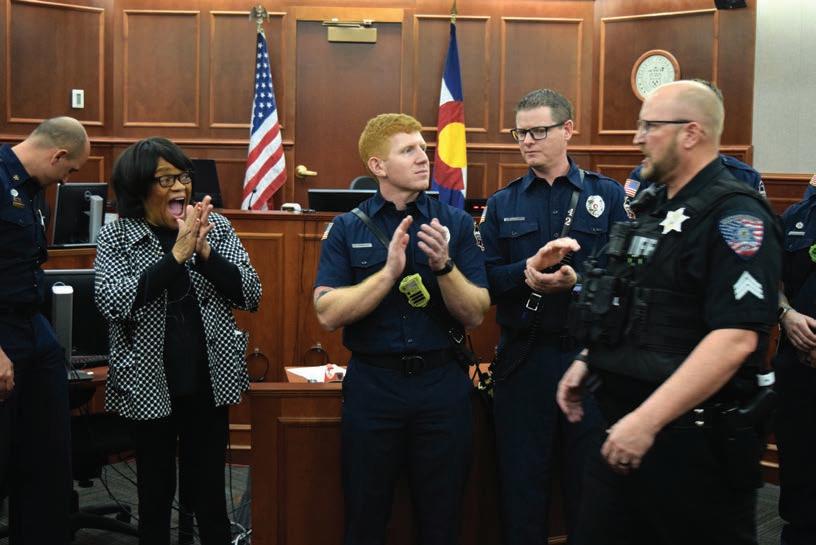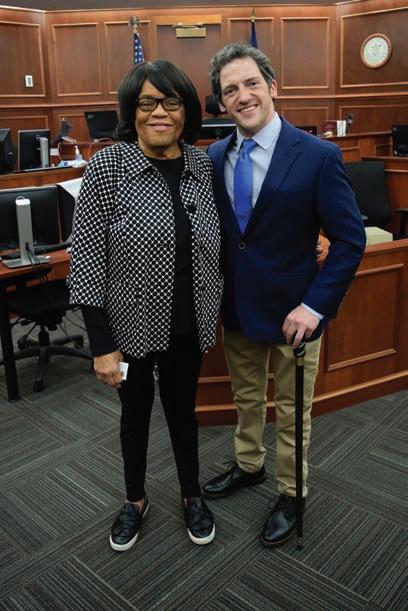
12 minute read
LIFE SAVED
Chase said the emergency happened during the courts’ lunch break, making it possible for many deputies, who otherwise would have been in trials, to respond to the scene.
Several o cers performed CPR on Bennett while others gathered witness statements and cleared pathways in preparation for South Metro Fire Rescue’s arrival. ey performed CPR for about 10 minutes before paramedics and emergency medical technicians arrived.
Bennett had two more heart attacks that day, one in the ambulance and one at the hospital.
Early intervention
Jens Pietrzyk, division chief of emergency medical services at South Metro Fire Rescue, told the group at the March 9 event that his department sees about 500 cases of cardiac arrest per year. Of that, only about 10% end in full recovery like Bennett’s case did.
One of the most important factors in being able to successfully resuscitate someone when they have cardiac arrest is early intervention.
“When somebody gets to the hospital after cardiac arrest, if they’ve had early CPR, if they’ve had early interventions, then we have something that we can work with,”
Jonathan Apfelbaum, medical director for South Metro Fire Rescue, said to the group. “But the time between when something happens and the time that they get there — if it’s not for people like yourselves, there’s nothing we can do.”
Deputy Mike Gentry, who was one of the rst on scene, said he’s performed CPR numerous times during his 13 years on patrol.
“She’s the rst one that we actually brought back,” he said.
Mitchell Kohl, a practicing attorney and a medical doctor, was walking out of a nearby courtroom when he saw the commotion.
“I got over there, took o my tie, got my sleeves rolled up and just started helping,” he said. “I will tell you, I wasn’t con dent in the outcome.”
Bennett was unresponsive, not breathing and had no pulse. Depu- move.
“Jury duty saved my life”


In Kohl’s eyes, Bennett’s attitude is one of the reasons she survived.



“ ere’s been evidence that shows having a good attitude in your recovery helps patients recover quicker and better,” he said. “And she’s a perfect example — her attitude’s infectious. And if there were more people with her attitude, the world would be a better place.”
Bennett said she hopes her experience inspires more people to get trained in CPR, as it truly can save lives. Before it saved hers, she started the CPR training program at RTD, where she worked for almost 40 years.
“I just wish it’s the kind of thing that everyone could learn to do,” she said. “I’m very much a proponent of CPR, rst aid, and all of those types of things. And I never knew it would go full circle and come back — that one day I would need it, and I had a whole band of angels there who came to my rescue.”
While most people dread receiving a jury summons, Bennett will never look at that civic role the same way.

“People have said ‘I’ll do anything to get out of jury duty,’” she said.
“Jury duty saved my life — because if I had not been at jury duty at that time, I would have been at home alone. And the outcome could have been totally di erent.” gained an eighth congressional district. Following a redistricting process, in November 2021, the Colorado Supreme Court approved the new, redrawn congressional maps, as reported by e Colorado Sun.
Crow, a Democrat who was reelected in 2022, represents Colorado’s sixth congressional district, which now includes Englewood.
“I’m really excited that this is a part of the new district,” Crow said. “ is is actually one of the most exciting parts of my job, just being here — being out, giving you an update on what I’m doing, taking your questions, taking your feedback. It helps me be a better representative and to do my job better.”
During the question-and-answer portion of the event, residents spoke to a variety of issues the community faces to learn more about Crow’s opinions and plans for action.
Education funding
Caty Husbands, a member of the Englewood Schools Board of Education, raised a question about the Individuals with Disabilities Education Act, also called IDEA, which is a federal law that ensures a free public education to eligible students with disabilities.
According to the National Center for Learning Disabilities, Congress promised to cover 40% of the extra cost of special education when IDEA was passed.

“Unfortunately, Congress has never come close to ful lling that promise,” the national center said on its website. “ e federal government is only covering 14.6% of the additional cost.” e IDEA Full Funding Act was introduced in November 2021 in both the house and the senate.
For Englewood Schools, Husbands said each year they dedicate roughly $2 million out of the general fund to pay the federal mandate.
“Where do you stand on the bill in the house as far as the full funding of IDEA?” Husbands asked.
“Under the 1975 IDEA legislation, the federal government committed to pay 40% of the average per pupil expenditure for special education,” according to a news release from the o ce of U.S. Rep Brian Fitzpatrick of Pennsylvania. “ e IDEA Full Funding Act would require regular increases in IDEA spending to nally meet our commitment to America’s children and schools.”
Crow is among the more than 130 co-sponsors listed on the proposed house bill.
“My position is the same, it hasn’t changed. I support full funding,” Crow said. “I’ll continue to push in the appropriations process for that. I think that’s in the best interest of our children, I think that’s in the best interest of the school district and the taxpayer.”
Husbands asked Crow if he had any thoughts on why U.S. Sens. Michael Bennet and John Hickenlooper have signed on to the senate bill. Crow said he will communicate to them why he supports it and ask them to do the same.
Centennial Airport
Audra Dubler, a leader of Quiet Skies Over Arapahoe County, focused her question on concerns about the Centennial Airport. e Quiet Skies organization is a group of residents advocating for changes to be made to address safety and noise concerns at Centennial Airport. For months, they have been attending meetings to raise concerns about increased air tra c, noise and lead pollution impacting residents, speci cally those living north of Arapahoe Road.
Dubler thanked Crow for issuing a letter in December, along with Bennet and Hickenlooper, that encouraged the Federal Aviation Administration (FAA) to attend the airport’s monthly community meetings in person.
Although the FAA had representation both in person and virtually at the February meeting, it did not have any representation at the March meeting.
“Our community is su ering,” Dubler said. “ e noise is so debilitating. ere’s about 600 training ights a day, 500 feet over our homes.”
“ e question being: How are you going to help? What is that timeline?” she asked Crow. “We’re just su ering and we need you more than ever.”
Crow noted there were a number of people in attendance from the Quiet Skies chapter, saying they have been wonderful partners. He also noted he is not happy.
He said he has a “long history of not being happy with the FAA,” explaining that there was a lack of engagement with the community when the FAA implemented NextGen around 2018 over the Denver International Airport.
“If you are a civil servant, a public servant, you show up and you listen to people. And they’re not doing it and I’m pretty pissed, frankly,” Crow said. “ e FAA reauthorization is up this year, so we do have leverage, right? e budget’s coming up and they need our money.”
Crow said he will work with Bennet and Hickenlooper to see how they can make the FAA engage in a productive way. He is not sure what the timeline will be, however.
“I’m going to do everything possible to try to hold their feet to the re,” he said.
Water concerns
One resident described Englewood’s water quality as “not stellar” and said an issue the city faces is the levels of man-made chemicals in its water treatment plant.
In February, the city announced that the levels of chemicals called PFAS (per- and poly- uoroalkyl substances) are above the Environmental Protection Agency’s newest interim health advisory levels.
Speci cally, the levels of per uorooctanoic acid (PFOA) and per uorooctane sulfonate (PFOS), which are PFAS compounds, tested above the new interim advisory levels.
e city, which supplies drinking water to approximately 57,000 people, said on its website there is not an immediate public health risk and people do not need to stop drinking their water.
However, exposure to low concentrations of these chemicals over time can cause health e ects, said Pieter Van Ry, director of the Englewood Utilities Department and the South Platte Renew, during a Jan. 23 city council special meeting.
“ ese are forever chemicals,” Van Ry said, explaining the chemicals date back to the 1940s and were used in materials such as re ghting foam, non-stick cookware and carpets.
Although these chemicals were widely used for many years, in the 2000s, concern about the potential health risk of these chemicals grew when PFOA and PFOS were detected in human blood, according to the EPA.
“Since that time, hundreds of di erent PFAS have been found in water, soil, and air,” the EPA’s website states.
“Many PFAS are made up of long chains of carbon- uorine bonds, such as PFOA and PFOS, are environmentally persistent, bioaccumulative, and remain in human bodies for a long time.”
Most uses of PFOA and PFOS were voluntarily phased out by United States manufacturers in the mid2000s, according to the EPA, but the chemicals remain in the environment due to their lack of degradation. e resident asked Crow what resources the federal government is able to provide in addressing this issue.
On a national level, Crow said that the Bipartisan Infrastructure Bill will help repair water lines and address some of the issues with PFOA and PFOS.
“Our water infrastructure, much like our electrical grid and our telecommunications grid, is aging, is not keeping up with the needs. And it’s causing a real health concern,” Crow said.
Crow said he has supported legislative e orts to ban the use of these forever chemicals and to make sure those chemicals are out of the water supply and ecosystem.
One way these chemicals get into the ecosystem is through re ghting foam at places like airports.
“And we’re trying to ban that through the National Defense Authorization Act, the DOD (Department of Defense) budget,” Crow said.
A 2022 study conducted by Westwater Hydrology LLC reported that PFAS pollution in Sand Creek and the South Platte River is connected, in part, to the Suncor re nery.
Crow said he is working with U.S. Rep. Diana DeGette, who he said has jurisdiction over that facility, to “make sure we’re holding them accountable,” as well as the state and the governor to address any regulatory issues and “force them to clean up their act, essentially.”
“With regard to Englewood, I’ll work with the city leadership. We have a meeting coming up with them soon, actually, with the mayor and the council to talk about speci c needs.
“One of the things that I’m able to do, there’s a program called the Community Project Funding, CPF funds, and I can actually put in speci c requests for large funding to address speci c infrastructure needs of communities,” he said. “In fact, I was able to get almost $4 million for the City of Aurora last year to help them replace an aging … waterline.”
If there is a similar need in Englewood, he said he can work with the city to submit a request.
Veterans’ mental health
Crow is a former Army Ranger who served in Iraq and Afghanistan. He said he is proud to now be serving as the Democratic co-chair of the bipartisan veterans’ caucus called the For
Country Caucus.
When one resident, named David, took the microphone to ask a question, he thanked Crow for his service. en, he became emotional as he spoke of his son.
“He served in Afghanistan as well, came home and separated and did not get the support he needed, and ended his life by suicide,” he said. “What more can we do to help our veterans and reduce this epidemic of suicide that’s going on today?”
“David, I’m — I’m very, very sorry you had to go through that,” Crow responded. “I also have lost friends to suicide. We’re losing about 19 veterans a day, actually, due to suicide.”
According to the 2022 National Veteran Suicide Prevention Annual Report, in 2020, there were 6,146 veteran suicide deaths — an average of 16.8 per day. e suicide rate for veterans in 2020 was roughly 57.3% greater than for non-veteran U.S. adults, per the report.
“ ere’s a crisis also, in particular, with our most recent veterans, and we saw a spike in suicide and mental health crisis with the collapse of Afghanistan,” Crow said. “A lot of vets, me included, struggled with what that meant, what our service meant and what we did over the last 20 years.”
In 2021, the U.S. withdrew the last of its troops from Afghanistan, resulting in the Taliban regaining control of the country and a refugee crisis as many Afghans ed, according to the Pew Research Center.
To his fellow veterans, Crow said that if they struggle with the meaning of their service and how things ended, remember there is a big di erence between the individual service of veterans and the politics and policy decisions surrounding those con icts.
“For the vets who raised their right hand and have served honorably and done their job, you should be proud of that service because you did your job,” Crow said.
“When somebody raises their right hand and takes that up, they are pledging to give up to their life, if necessary, for this country. Some of them do it in service,” Crow said before then taking a pause.
“And some of them do it after their service,” he continued, his voice starting to break. “ ey carry that pain with them. And those are numbers that aren’t included in the casualty count — but your son’s service matters and is noticed. And because of that, I believe we just need to be all in on our veterans’ bene ts, on our support services, in our funding.” e VA, however, does not keep data on this and does not track why it happens, how the VA responds and how they’re trying to prevent it. ere are also things people in the community can do to help veterans, namely being better about the way that people discuss the veterans’ experience, he said. ere is a 24/7, con dential crisis support line for veterans that can be contacted by dialing 988 and then pressing 1. People can also text 838255 or chat online at veteranscrisisline.net. e crisis line serves veterans, service members, national guard and reserve members and people who support them.
Crow said that is why he supported the PACT Act, a bill that expands health care and bene ts for veterans exposed to burn pits and other toxic substances.
He also supported increasing funding for the U.S. Department of Veterans A airs, also called the VA, while also supporting increased oversight and accountability of the VA, Crow said.
“And that’s why I also developed and came up with a bill called the Veterans’ Sentinel Act, and what this bill of mine does is would actually force the VA to start collecting data on veteran suicide on VA campuses.
“Because what we know is a lot of veterans — and this is a hard thing to say, it’s a hard thing to talk about — a lot of veterans actually take their lives at VA centers because they know that (if) they do that, that they’ll be taken care of. Let that sink in for a minute,” Crow said.
“I am pushing to force the VA to do some simple things and to give us data as policymakers to be better about it,” Crow said.
“We’re really good at thanking people for their service, tying yellow ribbons around trees, doing yovers at NFL games. But … we are terrible, we are awful as a society at sitting down and engaging with our veterans and sharing their burden,” Crow said.
He encouraged people to ask veterans what they did in their service, what burdens they carry and how they can share that burden.
“When we ask our men and women to go and ght on our behalf or do something on our behalf, that shouldn’t be their burden to bear alone,” he said.


Importance of collaboration
Crow, who is entering his fth year in Congress, said it has been a “crazy, tumultuous four years.”
“It’s been a wild time, there’s been nothing normal about any of it. But it’s truly been the pleasure, the honor of my life to do this work, and to represent all of you and to represent Colorado during one of our most challenging times,” he said. e challenges facing the country are more complicated than they’ve ever been, Crow said, adding that he does not have all the answers.
“I believe in this notion of servant leadership, which means that, you know, no one man or woman has all the answers. But if you can work together as a community, with a collaborative approach, we can all learn, and we can all advocate together,” he said.
“We’re not always going to agree,” he added. “But you’re always gonna know where I stand and why I stand that way. And I will always keep an open mind. And if you convince me otherwise, I’ll change my position … because I’m learning too.”
The promise of the U.S. and of the community, he said, is that people treat one another with civility and respect, keep an open mind, show up for respectful conversations and try to find answers together.
“ at is the only path forward,” he said. “ at is the way that I’m gonna conduct myself in this job so long as I’m in this position and I have the honor to represent you all.”
Residents interested in contacting Crow’s o ce to ask a question or get assistance with a federal agency can visit crow.house.gov/contact.










